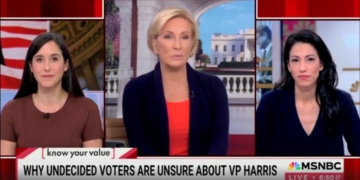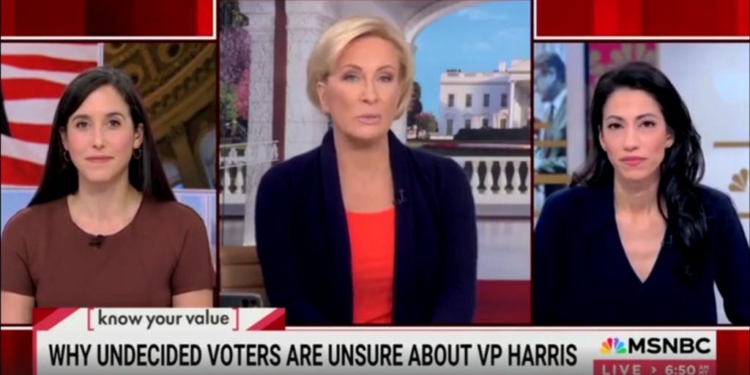Panelists on “Morning Joe” claimed Thursday that voters who expressed uncertainty about Vice President Kamala Harris’ policies or leadership abilities were “gender biased.”
Harris has come under fire for not providing details on policy and for generally avoiding the media, including not holding press conferences since President Joe Biden announced he was ending his reelection bid July 21. “Morning Joe” co-host Mika Brzezinski and guests Huma Abedin and Forbes Women editor Maggie McGrath said that those who expressed doubts about Harris needed to “use their imagination” and overcome “stereotypes.”
“It shows the real-life ramifications of the underrepresentation of women in leadership. Effectively, what researchers found is that when people assess a woman for a role she has never held before, they need to use their imagination, and they are bad at using their imagination, according to this research,” McGrath told Brzezinski.
WATCH:
“It seems as though ambition is still a bad word when it comes to women. A lot of these amorphous feelings, this idea that women are emotional, unlikable, difficult, some of the other terms that came up in that report, it’s like the more accomplished you are, the more suspect you are,” Abedin, a long-time aide to Hillary Clinton, said. “There was a term called Tall Poppy Syndrome, which I thought was very interesting, the more you stand out, the more you’re criticized as a woman. And to be a commander-in-chief, to be running to be commander-in-chief, well, there’s no greater, higher ambition than that. So I think some part of it is gender biased.”
She has backed away from left-wing positions she held during her campaign for the 2020 Democratic Party nomination for president primarily through statements by campaign aides to reporters. Harris’ proposal to allow the Federal Trade Commission to impose “harsh penalties” for “price gouging” by grocery stores unveiled during an Aug. 16 speech on economic policy.
The vice president has also been vague on many policy details during her campaign. Her campaign posted an “issues” section on its website, but it appeared to be a cut-and-paste from the reelection site for Biden.
“My biggest takeaway is that the onus to fix biased environments is not on those who are most affected, but on the rest of us and we do that in two really big ways. The first, let’s quantify, define and measure what exactly leadership potential looks like. In a business environment, this might be setting measurable goals for your direct reports and then tracking their progress. So you’ve literally seen the record and can make a decision based on that,” McGrath told Brzezinski.
“The other big thing we need to do is look at our own stereotypes that might be clouding our judgment. Lindsay Kohler is a great Forbes Women contributor who has written about this, and she says we should all take an implicit association test to measure our own biases,” McGrath continued. “You can do that online, go to Project Implicit. I tried it last night. They have a number of different exercises and it’s uncomfortable, but then once you know the ways in which you’re biased, you can work to fix them and — and hopefully build a more equitable and fair future.”
Harris leads former President Donald Trump by 2.2% in the RealClearPolling average of polls from Sept. 11 to Oct. 1, with the vice president’s lead dropping to 2% when Green Party candidate Dr. Jill Stein, independent candidate Cornel West and Libertarian candidate Chase Oliver are included in surveys.
(Featured Image Media Credit: Screenshot/Rumble/MSNBC)
All content created by the Daily Caller News Foundation, an independent and nonpartisan newswire service, is available without charge to any legitimate news publisher that can provide a large audience. All republished articles must include our logo, our reporter’s byline and their DCNF affiliation. For any questions about our guidelines or partnering with us, please contact [email protected].



























 Continue with Google
Continue with Google